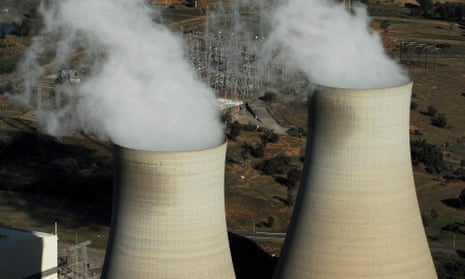The powerful lobby group representing Australia’s resources giants has backed the Morrison government’s controversial plan to underwrite new power generation, and says the replacement of the Liddell coal-fired power station must be the focus.
The Minerals Council of Australia has endorsed the program in contrast to the blast it has received from the energy sector and renewable energy groups, telling the government the importance of replacing retiring baseload power generation “cannot be overstated”, and baseload means coal, gas or hydro projects.
The MCA has also warned a future Labor government to honour any contracts for new power generation the Morrison government enters into before the next federal election, saying “without this, private-sector investors will be wary of investing in any projects which may be proposed”.
The energy minister, Angus Taylor, has flagged underwriting new coal projects under the scheme, and the possible indemnification of projects from the future risk of a carbon price. Labor strongly opposes both coal underwriting or any indemnification, although federally the ALP has a policy of not repudiating contracts.
Speculation is rife around the energy sector that the government underwriting proposal will ultimately centre on an extension of the Vales Point power station near Lake Macquarie in New South Wales. It is owned by Trevor St Baker, who was vocal during a recent stakeholder session convened to discuss the underwriting program.
The Centre Alliance senator Rex Patrick has attempted to warn the Morrison government against proceeding with projects or policy shifts that lack bipartisan support, given the proximity of the next federal election. This week Patrick characterised the Coalition’s current approach as “cart before the horse in circumstances where neither the cart nor the horse has been decided”.
The MCA says in its submission that potential policy changes by future governments need to be addressed in the contracts the Morrison government enters, with the investor capable of managing the impact. “This is central to the policy intent of providing an investment environment capable of supporting long-life assets.”
While the submission acknowledges the government should pursue a technologically neutral approach to new power generation that is consistent with Australia’s commitments under international climate agreements, it notes that baseload generators have underpinned the provision of “cheap, reliable and secure energy supplies” in Australia.
It points to the impact of the closure of the Hazelwood plant in Victoria, which was a significant spike in wholesale energy prices.
The MCA says it is concerned the closure of the Liddell power station “will expose the fragility of the power supply system in New South Wales” and notes the facility produced 4.8 TWh of baseload generation in the first six months of 2018 “that is available 24/7”.
While the owner of Liddell, AGL, has publicly unveiled a transitional plan for the facility, proposing to replace it with renewables, batteries, gas power, upgraded coal power and demand response, the MCA says “there are currently no investments being considered which are capable of replacing that level of 24/7 power output prior to 2022”.
It says the transition is already having an impact on wholesale energy market prices. “Future baseload prices in 2022 are already rising in Queensland and Victoria, however the biggest increase is in New South Wales, where future prices jump almost 37% from December 2020 to June 2022.”
It says: “The focus for the underwriting new generation investment program must be to replace the capacity and output that is about to be lost with the close of Liddell power station.”
The MCA says ageing coal plants need to be replaced “with lowest cost dispatchable energy supplies available 24/7” because, in the absence of new investment in baseload, “Australia will become more reliant on intermittent energy sources which may impact the security and reliability of the national energy market”.
It says irrespective of what projects come forward – “whether upgrades to existing thermal plants, new thermal facilities or renewables combined with firm capacity, the policy should aim to deliver low-cost power which meets the needs of Australian industry”.
The submission says the government should offer a range of financial and risk management instruments including options, swaps, futures and contracts for difference, and government loans to ensure proponents come forward with a range of generation projects.
But it is cool on the notion of using capacity payments – a system of incentives used commonly overseas to ensure sufficient supply is available to the grid.
Taylor is spearheading a supercharged process with the underwriting program, wanting guidelines to be finalised before calling for expressions of interest over December and January – a timeframe with an eye to the next federal election.
The progressive thinktank the Australia Institute has criticised the haste. The institute says the Coalition is calling on interested parties to pitch projects before the parliament has set up the necessary legislative framework – a procedure “which poses a number of risks”.
It is unclear whether the government will be able to secure parliamentary backing for the program.
